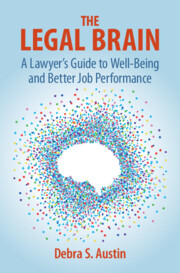Book contents
- The Legal Brain
- The Legal Brain
- Copyright page
- Dedication
- Contents
- Acknowledgments
- Introduction
- 1 The Impaired Lawyer
- 2 The Spectrum from Languishing to Flourishing
- 3 The Lawyering Culture
- 4 The Lawyer’s Brain
- 5 Memory, Knowledge, and Building Expertise
- 6 Motivation, Reward, and Developing Habits
- 7 The Impact of Stress
- 8 The Influence of Self-Medication
- 9 The Importance of Fuel
- 10 Optimizing Brain Health
- 11 Enhancing Mental Strength
- 12 Developing an Action Plan for the Neuro-intelligent Lawyer
- 13 The Neuro-intelligent Legal Organization
- Conclusion
- Select Bibliography
- Index
7 - The Impact of Stress
Published online by Cambridge University Press: 08 May 2024
- The Legal Brain
- The Legal Brain
- Copyright page
- Dedication
- Contents
- Acknowledgments
- Introduction
- 1 The Impaired Lawyer
- 2 The Spectrum from Languishing to Flourishing
- 3 The Lawyering Culture
- 4 The Lawyer’s Brain
- 5 Memory, Knowledge, and Building Expertise
- 6 Motivation, Reward, and Developing Habits
- 7 The Impact of Stress
- 8 The Influence of Self-Medication
- 9 The Importance of Fuel
- 10 Optimizing Brain Health
- 11 Enhancing Mental Strength
- 12 Developing an Action Plan for the Neuro-intelligent Lawyer
- 13 The Neuro-intelligent Legal Organization
- Conclusion
- Select Bibliography
- Index
Summary
Stress causes brain damage. Unrelenting stress is an essential feature of legal education and legal practice, and chronic stress hurts the brain. Lawyers suffer from higher rates of anxiety and depression than the rest of the population and they rank fourth in professions with the highest number of suicides. Lawyers’ anxiety, depression, and suicide rates are likely linked to overwork and exposure to toxic chronic stress. Anxiety and depression can cause changes in the brain that are related to an overactive fight-or-flight stress response system. Lawyer languishing, a state of incomplete mental health, may be a precursor to lawyer’s anxiety or depression. The rat-fumbling researcher Hans Seyle noticed that the discomfort his lab rats suffered made them sick. He used the term stress to describe the general unpleasantness his rats experienced when he routinely dropped, chased, and recaptured them during his experiments. The culture of his lab was making his rats sick. When law school or legal practice cultures subject students or lawyers to a broad array of incessant stressors; the general unpleasantness is prone to make them physically and emotionally sick; and it damages their brain.
- Type
- Chapter
- Information
- The Legal BrainA Lawyer's Guide to Well-Being and Better Job Performance, pp. 73 - 87Publisher: Cambridge University PressPrint publication year: 2024

